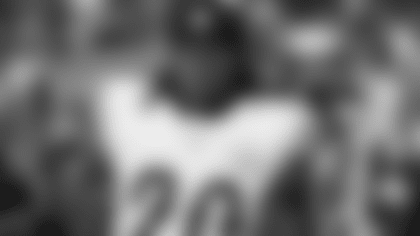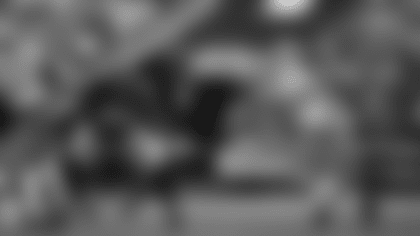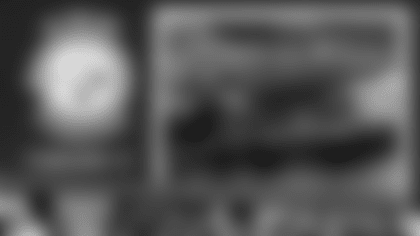Q. Would you agree with the statement that in the NFL it's more difficult to win on the road?
A. I would.
Q. What makes winning on the road more difficult?
A. Just some natural environmental things. Forget all of the other intangibles, because I'm talking about very tangible things. Crowd noise is a tangible factor, and it's a tangible factor on possession downs. Defenses at home have an edge because offenses work on a silent count. On the road, you can't utilize the cadence to undress defenses and gather information. You can't utilize the cadence in an effort to get off the ball in a timely manner. So everyone's getting off the ball visually, and the defense, especially a group like Jacksonville's that has a very talented four-man front that builds their rush in that way, it's a definite advantage for those guys. Consequently on the other side, they can use cadence as a weapon. You have to be sharp, because they'll work to keep you off balance in terms of when they're snapping the ball. You better be careful on possession downs, because on third-and-5 or less, you don't want to give them a free set of downs by jumping offside. You don't want to get caught in disguise packages. One of the interesting things Jacksonville does on defense, they have some hardcore cover-zero looks, meaning all-out blitzes and they really only do them at home. They only do them at home because they know that at some point before the snap, Ramon is going to reach over and tap Maurkice Pouncey. And that gives them an indication to get out of that disguise. So there are some variables you have to contend with on the road, and there are some specific ones we have to contend with this week that are tangible reasons why it's more difficult to operate.
Q. Is it even more difficult based on how far a team has to travel to play the game?
A. I don't delve into the optimum sleep time and body clock and all of that. I just know that we all play eight at home, and we all play eight on the road, so in that sense it's fair. I tend to focus specifically on the in-game elements of operating, in terms of it being a disadvantage over not being at your home venue.
Q. What about the concept of practicing at altitude if your team is going to have to play a game at altitude, such as playing in Denver or Mexico City?
A. I'd just as soon show up in very good shape and play football. I don't over-analyze it in that way. There has been a lot of good football played over the years – Vince Lombardi and people like Chuck Noll didn't waste time on some of that minutiae, and they fielded really good football teams.
Q. What characteristics make for a good road team?
A. A team that embraces the challenge. When you go into hostile environments, certain individuals embrace that and that brings the best out of them. I like being with that kind of group, and I think with this group some of our key components have that mentality. When you tell Ben he can't do something, then you have his attention and that competitive spirit flows out of him. You put him in a hostile environment, and that competitive spirit flows through him. Really, I just think it's the makeup of your team and its key people. I've always believed we have a group that embraces it.
Q. When it comes to in-game substitution patterns, and I'm not talking about different personnel groupings in sub-package football, but more along the line of giving guys some rest – are those planned during the week of preparation?
A. In some instance they're planned, and in some instances they unfold due to game circumstances. And it happens probably equally both ways.
Q. If the plan is to rotate defensive linemen, as an example, could the score of the game impact that?
A. That's why I said exactly what I said in answering the previous question. You come into the game with a plan for rotation, or an intended rotation, but game circumstances always have an impact on that. You want to give guys a chance to find a rhythm in play. We've been rotating Morgan Burnett and Terrell Edmunds some, and so if you go every other series, well, one series might be a three-and-out and the next series is an eight-and-out. There's an imbalance, and so you always come in with an intended plan and you're always open to that plan changing some due to in-game circumstances.
Q. In a game like last Thursday vs. Carolina where the margin on the scoreboard becomes significant, how do you decide when to pull the starting quarterback?
A. I don't think a lot about it, to be honest with you. When you're there, you know it. You can waste a lot of time worrying about good problems like that, and so I don't. I let the game play out, and when you're there, you know it.
Q. Behind James Conner at running back, is there a set pecking order on game days?
A. It depends on circumstance. You have two guys with two distinct skill-sets. Stevan Ridley is a one-cut downhill runner who has a certain run demeanor, and Jaylen Samuels is a quality young guy who has distinguished himself in the passing game, particularly in college, and he's working to round out his game in other areas. We're afforded an opportunity to use those guys because of skill-set, but we're also at times just rotating them on a fluid basis as well.
Q. Last year, you lost two games to the Jaguars, including one in the Divisional Round of the playoffs. The Jaguars are today's opponent. Is revenge a real motivator for professional athletes?
A. For some. And I mean that in this way: some people are very methodical and professional, they turn the page. They realize there are a new set of variables this year. There are new components on the team, etc. Some guys weren't on our team a year ago, like Morgan Burnett, Terrell Edmunds and other guys, and so they cannot relate to the experience. They go through the journey during the week and hear the experiences, but if they weren't there they legitimately don't care. There are other guys who had lesser roles, so quite frankly it means less to them. It hurt less. It meant less to James Conner in 2017 than it potentially would in 2018 because of the role he now plays within the group. And so I'm very sensitive and aware of those things. It's not something you talk formally about. It's good fuel for some. You acknowledge it's not fuel for others because of their experiences.
Q. Here are some combined statistics from those games last year: Jacksonville ran for 395 yards and scored six rushing touchdowns: and the Steelers turned the ball over seven times. As a head coach, which one of those grates on you more, and why?
A. Probably the rushing, because that's down in and down out. You can have bad games in terms of ball security, and often times those can be quick fixes, if you will. We turned the ball over a lot in week one of this season, and we kind of rectified that and have gotten stable in protecting the ball. Rushing yards and running through you for touchdowns speaks to the nature of the matchup, and if there's any residue (from last year) that anybody's toting it's that.
Q. If an opponent is running the ball virtually at will, as the Jaguars did last year, is it fair to assume your team is getting handled physically?
A. No question.
Q. Is there anything to be done about that as it's happening?
A. Yes. Fight back. Seriously, there is not anything mystical about certain elements of this game. It's physicality. It's no different than the sport of boxing. That's a combat sport. If somebody is getting beat to the punch, they're simply getting beat to the punch and their face is getting beaten in. What are they going to do about it?
Q. Is your run defense better now than it was the last time you faced the Jaguars?
A. I hadn't thought about it in terms of comparing it. It just needs to meet the needs of the day, whatever day that is. You get a chance to reflect in this way because the opponent is similar, but they're not the same as they were a year ago. None of us are. Even if we meet the challenge, per se, today in terms of standing up and minimizing their run game, it doesn't necessarily mean we're better because they're not the same group as they were in 2017. That's why I'm very cautious about drawing any comparisons in that regard. I'm simply focused on us not allowing those guys to run the football today.














